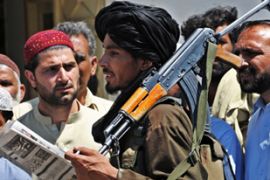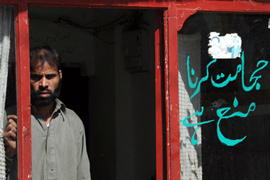Pakistan Taliban ‘re-enters’ Buner
Fighters reportedly returning from neighbouring Swat, only hours after retreating.

Army assurance
Meanwhile, General Ashfaq Kayani, Pakistan’s army chief, has sought to dispel doubts that the country’s armed forces were reluctant to take on the fighters.
| In depth |
|
|
The army “will not allow the militants to dictate terms to the government or impose their way of life on the civil society of Pakistan”, he said in a statement after a meeting of high-level military commanders on Friday.
Asif Ali Zardari, the Pakistani president, ratified a deal in April to put Malakand – home to about three million people in northwest Pakistan, including the district of Buner – under sharia, or Islamic law, as part of efforts to end a Taliban revolt.
Critics who attacked the Swat deal on the grounds that the government “capitulation” would only embolden the Taliban, have said that the fighters’ entry into Buner vindicates their fears.
US response
As the Taliban demonstrates its renewed influence in northwest Pakistan, US leaders have urged their Pakistani counterparts to stand firm.
General David Petraeus, the head of US Central Command, said the Taliban is more of a threat to Pakistan than longtime rival India and urged that a governmental committee fully support Pakistan’s military in its fight against the Taliban.
“The most important, most pressing threat to the very existence of their country is the threat posed by the internal extremists and groups such as the Taliban and the syndicate of extremists in the federally administered tribal areas,” Petraeus said.
But Murad Khan, former spokesperson for Pakistan’s military, said that the US and Pakistan have failed to counter the idealogy of the Taliban due in part to a lack of trust.
“There is an apparent and evident trust defecit between the two countries,” Khan said. “They haven’t devised a counteridealogy to counter the Taliban’s idealogy, which is based on fundamentalism and extremism.”
Taliban presence
Hundreds of armed Taliban fighters had set up checkpoints and occupied mosques in Buner.
 |
| A barber stands by a ‘Do not shave’ warning placed by the Pakistani Taliban [AFP] |
Some fighters in Buner reportedly moved into another nearby district, Shangla, on Thursday.
Our correspondent said the chief minister of the northwestern provinces held emergency talks with all the political parties on Friday.
“The meeting was around the fact that the Taliban had received what they wanted – the imposition of sharia [Islamic law] in Swat – but had not respected their part of the deal, which is laying down the weapons,” she said.
At the end of the meeting, the political leaders reportedly issued a statement saying that military intervention was the only option since the Taliban had not respected their part of the peace deal.
The Pakistani Taliban, under the leadership of Maulana Fazlullah, launched a campaign nearly two years ago to enforce sharia in the Swat valley, beheading government officials, destroying girls’ schools and forcing thousands of people to flee.

 Video: Turning to the Taliban
Video: Turning to the Taliban